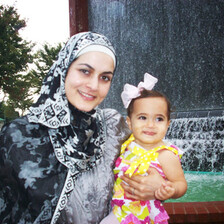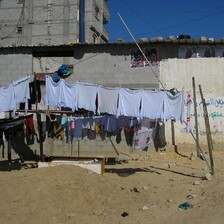Al Jazeera 30 January 2005
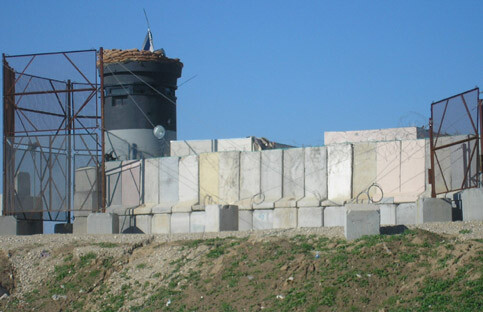
Unlike areas of the West Bank, Israeli soldiers in Gaza are unseen. They remain cocooned deep within lookout towers behind ever extending military fortifications, including sandbags, electric fences, pill boxes and tanks. (Arjan El Fassed)
In a filthy corner of the Rafah border crossing surrounded by empty juice bottles and countless cigarette butts, and as far away as possible from the putrid stench of the terminal’s only toilet, Um Ammar huddled with dozens of other women in an effort to keep warm from the desert night cold.
The women sat atop cardboard boxes and ragged beige blankets - a donation from the Red Crescent - that had worn thin from use. For at least one night, this was their bed, and for the last 50, a foreign land their home by force.
Um Ammar had initially travelled to Egypt - an arduous 14-hour journey by land - to accompany her nephew, who was due to receive medical treatment unavailable to him in Gaza.
But along with thousands of other Palestinians, she found herself stranded on Egyptian soil, unable to return home, when Israeli occupation forces closed the Rafah terminal, Gaza’s only route to the outside world, on 12 December 2004.
That was the date Palestinian resistance fighters detonated a bomb in a hand-dug tunnel under the border, killing five occupation soldiers. The Israeli response was to prevent Gaza’s 1.4 million Palestinians - including the sick, the elderly, students, and some Muslim pilgrims, from leaving Gaza, and about 20,000 others on the outside from re-entering, a move decried as collective punishment by human rights organisations.
Ongoing humiliations
Nearly five weeks later, when the crossing finally re-opened - for incoming traffic only - Israeli forces sent three bus loads of Palestinian travellers back to Egypt from the Israeli side of the terminal after deciding to close for the day earlier than promised.
As a result, Um Ammar and about 250 others were forced to spend the night, and their Eid holiday, in the departure hall, as they braced themselves for this border town’s brutal winter nights.
“You can do without food but you can only go so long without something to keep you warm in this weather,” said Um Ammar, who spent a bittersweet and chilly Eid apart from her husband and nine children, waiting anxiously for her return to Gaza.
“We are under the mercy of the occupiers. We can only go home when they tell us to go home. And when we do return, we are returning to one big prison,” she said.
Little progress
Um Ammar is one of millions of Gaza residents for whom travel, both within Gaza and outside of it, has become a ritual of struggle and sacrifice that often goes unnoticed between the seams of occupation, and that is not set to improve anytime soon. A task as simple as commuting to college, to work, or to visit family, or one as dire as seeking emergency medical treatment has become a life-threatening event and often a day-long ordeal.
According to the Palestinian Center for Human Rights, Gaza has been under a total siege and closure imposed by Israeli occupying troops on the Gaza Strip since September 2000, depriving millions of Palestinians from their civil, political, economic, social and cultural rights.
In addition, all three of Gaza’s terminals have been closed, partially if not fully, for years, with Palestinians facing a variety of restrictions on travel since long before then.
Palestinians have been prevented from crossing into Gaza via Erez and denied access to all Israeli airports since before the onset of the second Intifada in September 2000. Their own airport’s runway was destroyed by Israeli occupation forces at the start of this uprising.
Rafah crossing
The Rafah terminal bordering Egypt in the southern Gaza Strip has become the only access point to the overpopulated Strip for Palestinian residents.
It opens only a set number of hours each day when open at all, with limited cars being allowed through. In addition, Palestinians between the ages of 16 and 35 are not allowed out, accounting for about 13% of Gaza’s population unable to receive medical treatment abroad, attend universities or return to work in foreign countries.
But the agony for Palestinian commuters does not end on borders. Exhausted after a nearly 14-hour journey that includes hours of waiting inside a number of buses and taxis crammed to maximum capacity, in the intense heat of summer or bitter cold of winter, Palestinian travellers have a myriad of checkpoints to face before reaching their various destinations.
They tear apart the Gaza Strip, north from south, east from west. And their ability to pass through at any given hour on any given day is at the discretion of the soldier manning the checkpoint from afar.
Hidden commanders
Unlike areas of the West Bank, the soldiers in Gaza are unseen. They remain cocooned deep within lookout towers behind ever extending military fortifications, including sandbags, electric fences, pill boxes and tanks. One can barely make out a megaphone, a tip of a machine gun, and occasionally, when all else fails to catch the attention of the hundreds of cars awaiting orders to move forward or back away, a distant wave of a hand.
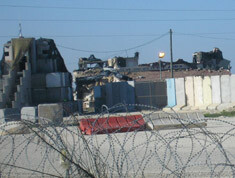
Israeli soldiers in Gaza are unseen. (Arjan El Fassed)
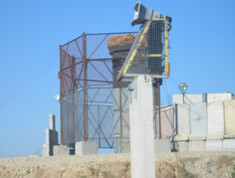
They remain cocooned deep within lookout towers. (Arjan El Fassed)
It is the latest in a series of preliminary steps being taken prior to the Israeli disengagement from Gaza this July, all in an effort to restructure the occupation - to remove all its visible markers, giving the impression to the untrained eye that there is no occupation at all.
It is stark and eerie. Living in Gaza has become somewhat like being trapped inside a snow globe, except there is no colourful confetti to cloud the stark reality of occupation.
Power kick
The first of the checkpoints is Abu Huli, in whose name hundreds of acres of Palestinian land have been levelled and confiscated. The voice that bellows from the massive pillbox controlling the lives of millions who attempt to cross though every day sounds rude, condescending and merciless.
The occupation army does not discriminate between civilian commuters, ambulances, supply lorries, or UN vehicles. All are unable to pass when the soldier so orders. As one Israeli army reservist explained, on the condition of anonymity, it is a power rush.
In a cacophonous mélange of broken Arabic and Hebrew that only Israel soldiers seem to have mastered, the one stationed at Abu Huli bellows out orders to particular cars to move back or turn around. Failure to obey, assuming the orders were even understood clearly, can be deadly.
Netzarim checkpoint
After Abu Huli, a Palestinian residing in Gaza City or in the north of Gaza has then to face the Netzarim checkpoint.
Until now, this has been a mobile checkpoint. On certain days, and at certain hours, Israeli bulldozers will, unannounced, move towering mounds of sand to block the coastal road - and the only road - dividing the north of the Gaza Strip from the south, literally crippling traffic, and shooting at any pedestrians that attempt to cross over, a practice that has proven fatal on numerous occasions according to the Palestinian Center for Human Rights.
Now, a permanent structure like that at Abu Huli is being constructed, confiscating yet more Palestinian land, and further cementing Israel’s control over Palestinian life.
What disengagement?
Never mind the much lauded disengagement plan; or the post-Yasir Arafat period of calm and imminent peace that self-proclaimed experts insist are upon us. Israeli Prime Minister Ariel Sharon’s planned disengagement from Gaza is unlikely to bring relief to the 1.4 million residents here.
According to the plan, Israel will retain the right to re-enter the Gaza Strip at any time, and will maintain control of Gaza’s borders, air, and sea space. It is a plan that Palestinian officials have said will create “the biggest detention camp in the world.”
According to Mustafa al-Barghuthi, president of the Union of Palestinian Medical Relief Committees (UPMRC) and former presidential hopeful: [It is not about withdrawal, it is about redeployment; it is about reinstating and restructuring the occupation in the form similar to the apartheid system. Gaza will effectively become one huge prison.”
Security claim
Time and again, Israeli forces provide a blanket explanation for the closures and the checkpoints: security. As their latest attempt to win over the Palestinian mind - a propaganda publication entitled The Truth distributed to weary travellers at the end of their Rafah journey states, it is security-related, and it is your fault.
“We are an extremely humanitarian army which only has your best interests at hand,” read the latest issue of the newsletter. “The truth? We know what the truth is,” one traveller retorted upon being handed a copy of the propaganda publication at the end of his Rafah journey this month. “As long as they control the borders, there can be no peace.”
Laila El-Haddad is a journalist based in the occupied Gaza Strip. This article was originally published by aljazeera.net and reprinted on EI with permission.
Related Links


